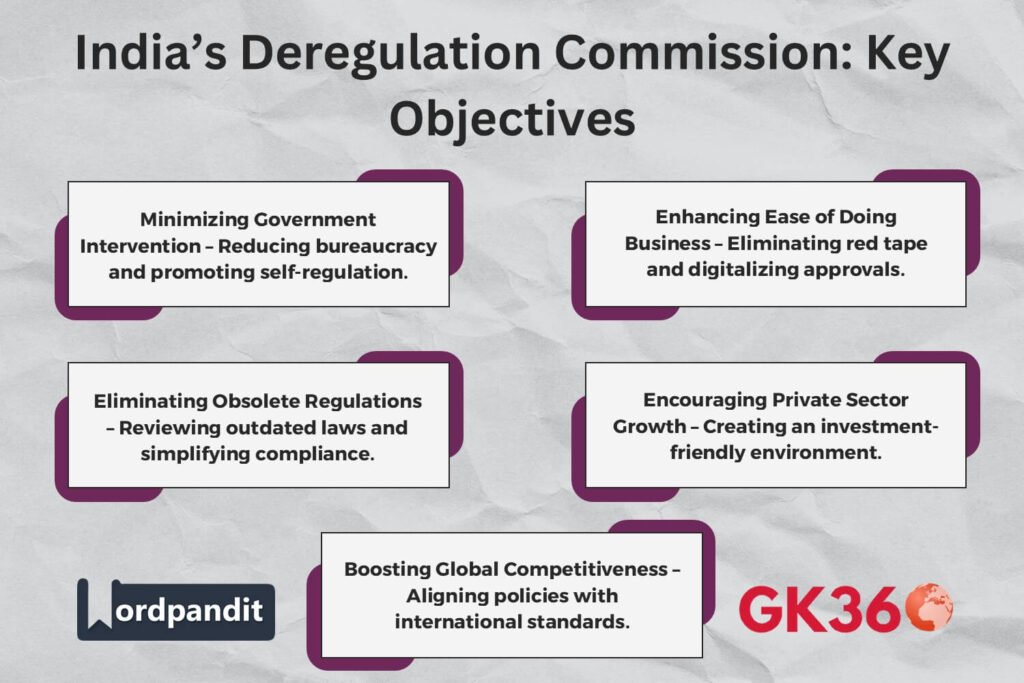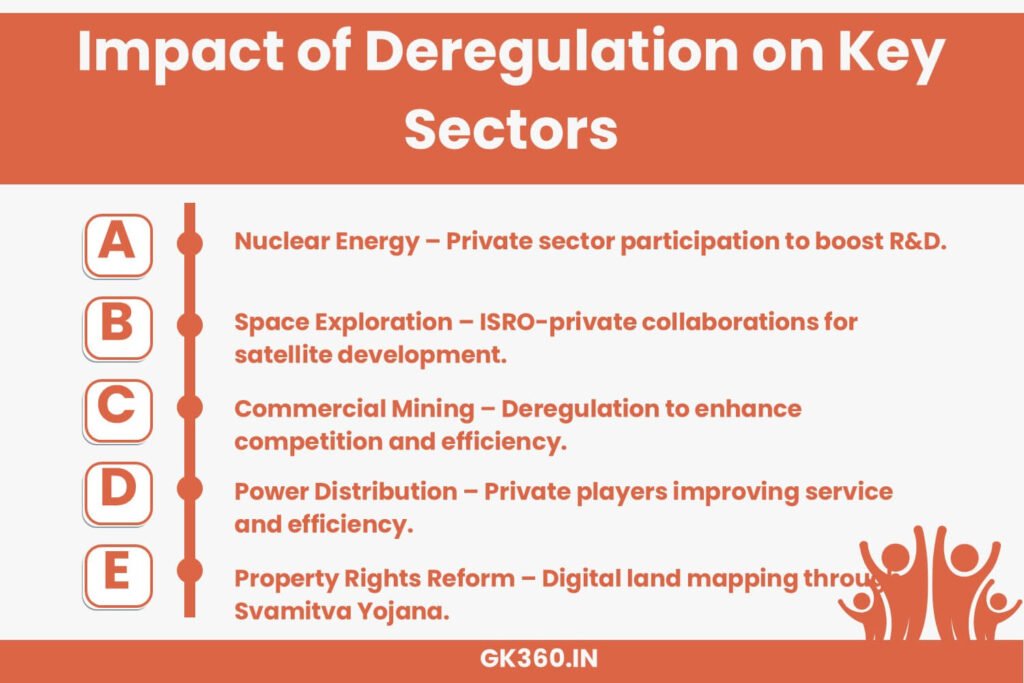India Deregulation Commission: Transforming Governance & Boosting Economic Growth
Introduction: India’s Push for Deregulation
India is taking a significant step toward economic liberalization with the establishment of the Deregulation Commission. Announced by Prime Minister Narendra Modi at the ET Now Global Business Summit, this initiative aims to reduce government interference, eliminate outdated regulations, and enhance ease of doing business in India.
The commission will play a key role in making India an investment-friendly destination by simplifying governance, fostering private sector participation, and aligning policies with global economic trends.

Table of Contents
- Introduction: India’s Push for Deregulation
- What is the Deregulation Commission?
- Key Objectives of the Deregulation Commission
- Impact on Key Sectors: Reforms & Investments
- Property Rights Reform: Svamitva Yojana’s Impact
- Performance-Driven Politics: Economic & Governance Achievements
- Revamping the Banking Sector: Financial Reforms & Growth
- India’s Economic Growth & Future Prospects
- Judicial Reforms: Modernizing India’s Legal System
- FAQs: Common Questions About Deregulation in India
- Conclusion: Towards a Business-Friendly, Efficient Economy
What is the Deregulation Commission?
The Deregulation Commission is a strategic initiative by the Indian government to streamline regulatory frameworks and reduce bureaucratic hurdles. It is designed to encourage innovation, improve governance, and foster a competitive business environment.
This initiative aligns with the government’s broader reform agenda of making India a global economic powerhouse by ensuring policies are business-friendly and adaptable to modern economic challenges.
Key Objectives of the Deregulation Commission
1. Minimizing Government Intervention
- Reducing unnecessary bureaucracy in economic activities.
- Encouraging self-regulation in industries.
- Shifting towards performance-based governance rather than process-driven regulations.
2. Enhancing the Ease of Doing Business
- Eliminating red tape to simplify compliance for businesses.
- Promoting digital governance to make approvals and licenses faster.
- Enhancing India’s ranking in the World Bank’s Ease of Doing Business Index.
3. Eliminating Obsolete Regulations
- Reviewing redundant laws that hinder economic growth.
- Implementing Jan Vishwas 2.0, a reform aimed at simplifying compliance and reducing penalties for minor violations.
4. Encouraging Private Sector Growth
- Creating an investment-friendly ecosystem.
- Opening new sectors for private participation and foreign direct investment (FDI).
Impact on Key Sectors: Reforms & Investments
1. Nuclear Energy
- Private participation allowed in non-critical areas to boost research and development.
2. Space Exploration
- ISRO collaboration with private firms to enhance satellite development and commercial launches.
3. Commercial Mining
- Coal and mineral mining deregulated, increasing competition and efficiency.
4. Power Distribution
- Introduction of private players to enhance efficiency and customer service.
These reforms aim to increase investment, enhance competition, and position India as a leader in the Fourth Industrial Revolution.
Property Rights Reform: Svamitva Yojana’s Impact
The Svamitva Yojana, launched on April 24, 2020, aims to:
- Digitally map rural land using drones.
- Provide property ownership documents to villagers.
- Enable financial empowerment by allowing land to be used as collateral.
- Reduce land disputes with accurate demarcation.
So far, 3 lakh villages have been surveyed, benefiting millions of rural citizens.
Performance-Driven Politics: Economic & Governance Achievements
India’s governance is shifting towards results-oriented policymaking. Key achievements include:
- 25 Crore People Lifted Out of Poverty through economic and welfare policies.
- Increase in Zero-Tax Threshold from ₹7 lakh to ₹12 lakh, benefiting the middle class.
- Growth-Oriented Policies driving sustained GDP expansion.
Revamping the Banking Sector: Financial Reforms & Growth
The Modi government has revived India’s banking sector through:
- Jan Dhan Yojana – Expanding financial inclusion.
- Mudra Yojana – ₹32 lakh crore in small-business loans.
- Public Sector Banks’ Profit Growth – ₹1.25 lakh crore profits in nine months.
These reforms have strengthened India’s financial system and supported economic expansion.
India’s Economic Growth & Future Prospects
India’s economic rise includes:
- 5th Largest Global Economy – Ahead of the UK and France.
- Structural Economic Reforms driving industrial and digital growth.
- Targeting 3rd Largest Economy by surpassing Germany and Japan.
Judicial Reforms: Modernizing India’s Legal System
The Bharatiya Nyaya Sanhita (BNS) replaces colonial-era laws with:
- Faster legal proceedings to reduce case backlogs.
- Modernized legal framework aligning with contemporary needs.
FAQs: Common Questions About Deregulation in India
1. What is the purpose of India’s Deregulation Commission?
It aims to reduce bureaucratic hurdles and make India a business-friendly economy.
2. How will deregulation impact businesses?
Businesses will experience faster approvals, fewer compliance burdens, and greater investment opportunities.
3. What is Jan Vishwas 2.0?
It is a reform initiative to simplify compliance by reducing unnecessary penalties.
4. How does deregulation impact FDI?
FDI will increase as businesses find it easier to operate in India.
Conclusion: Towards a Business-Friendly, Efficient Economy
The Deregulation Commission is a game-changer for India’s economy, fostering a transparent, investment-friendly environment. By simplifying governance, boosting private sector participation, and modernizing regulations, India is moving toward its Viksit Bharat 2047 vision.
Key Takeaways Table
| Aspect | Details |
|---|---|
| Purpose of Deregulation Commission | To reduce bureaucratic hurdles and promote a business-friendly environment. |
| Major Focus Areas | Minimizing intervention, ease of doing business, eliminating obsolete laws, private sector growth. |
| Key Reforms in Sectors | Nuclear energy, space exploration, commercial mining, power distribution. |
| Property Rights Reform | Svamitva Yojana for digital land mapping and ownership verification. |
| Economic Achievements | 25 crore lifted out of poverty, increased zero-tax threshold, growing global economic ranking. |
| Financial Sector Reforms | Jan Dhan Yojana, Mudra Yojana, PSU bank profitability surge. |
| Judicial Modernization | Replacing colonial-era laws with Bharatiya Nyaya Sanhita (BNS). |
Related Terms:
- India Deregulation Commission
- Economic Liberalization in India
- Ease of Doing Business India
- Indian Regulatory Reforms
- Private Sector Growth India
- Property Rights Reform India
- Financial Reforms Modi Government
- India Economic Growth 2024
- Judicial Reforms in India
- Investment Opportunities in India






